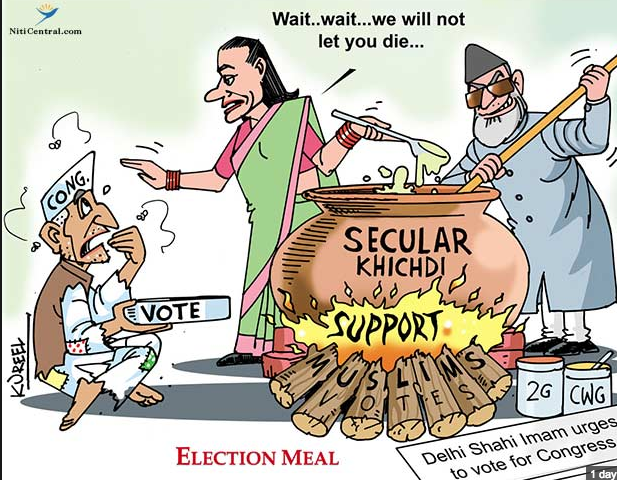 Abdul Basit Alvi
Abdul Basit Alvi
The Bharatiya Janata Party (BJP), a prominent political entity in India, has come under scrutiny for its alleged involvement in incidents perceived as discriminatory or antagonistic towards minority communities. These occurrences have ignited discussions regarding the party’s commitment to secularism, religious tolerance, and inclusive governance. Despite the BJP frequently asserting its dedication to the well-being of all citizens, irrespective of their religious or cultural affiliations, its detractors point to several contentious events as indicative of a different reality.
One significant example is the 2002 Gujarat riots, which transpired during the tenure of Chief Minister Narendra Modi, later to become India’s Prime Minister. The riots, predominantly targeting Muslims, resulted in widespread violence, loss of lives, and mass displacement. The state government, led by the BJP, faced accusations of failing to prevent the violence and of being complicit in the assaults on minority communities. These riots continue to cast a shadow over Modi’s political legacy and raise doubts about the BJP’s professed commitment to minority rights.
Another contentious event is the 2013 Muzaffarnagar riots in Uttar Pradesh, where clashes between Hindu and Muslim communities led to numerous fatalities and the displacement of thousands. The BJP’s purported role in exacerbating communal tensions preceding the riots has been intensely scrutinized, with critics alleging the party’s utilization of divisive rhetoric and identity politics to polarize voters along religious lines for electoral advantage. Political adversaries of the BJP have questioned its dedication to promoting communal harmony and religious coexistence.
In recent years, cow vigilantism has emerged as a focal point for communal tensions in India. Vigilante groups, claiming to safeguard cows, revered in Hinduism, have been implicated in numerous attacks on individuals, primarily Muslims and Dalits, suspected of slaughtering or consuming beef. Despite the BJP condemning vigilantism, its ideological alignment with cow protection has emboldened such groups and fostered an environment of impunity. The inefficacy of law enforcement agencies in curtailing cow vigilantism has heightened apprehensions regarding the safety and rights of minority communities.
Moreover, the enactment of the Citizenship Amendment Act (CAA) in 2019 sparked nationwide protests and controversy due to its perceived discriminatory nature. The CAA offers an expedited pathway to Indian citizenship for undocumented migrants from Afghanistan, Bangladesh, and Pakistan, while excluding Muslims from its scope. This legislation contravenes the secular principles enshrined in the Indian Constitution and discriminates against Muslim immigrants, undermining India’s commitment to religious pluralism and equal treatment under the law. Its implementation has raised apprehensions about the marginalization and exclusion of Muslim communities.
The inauguration of the Ram Temple in Ayodhya stands as a pivotal moment in India’s socio-political landscape, symbolizing the resolution of a protracted legal and ideological dispute over the site believed to be the birthplace of Lord Ram. While celebrated by many as a testament to religious fulfillment and national unity, the timing of the inauguration, amidst ongoing political developments and preceding crucial state elections, has sparked discussions regarding its underlying motivations and electoral ramifications.
The BJP is actively involved in several initiatives aimed at appealing to the Hindu majority voters. The Ram Temple has long been a focal point of Hindu nationalist aspirations, with the Bharatiya Janata Party (BJP) and its ideological allies advocating for its construction as a symbol of Hindu pride and identity. The Supreme Court’s historic verdict in November 2019, which granted the disputed site to Hindu litigants for the temple’s construction, was celebrated as a victory by supporters of the temple movement, including the BJP. However, the timing of the inauguration ceremony on August 5, 2020, amidst the COVID-19 pandemic and ahead of elections in Bihar and other states, has led to speculation regarding its political motivations.
The BJP’s decision to prioritize the inauguration of the Ram Temple during the pandemic and electoral campaigns is seen as a calculated political move aimed at mobilizing its Hindu nationalist base and consolidating support before crucial elections. By aligning itself with a deeply revered religious cause, the party aims to appeal to voters’ religious sentiments and rally support, thereby bolstering its electoral prospects. Additionally, the symbolism of the temple inauguration, fulfilling a longstanding promise, reinforces the BJP’s narrative as a champion of Hindu interests and aspirations, further solidifying its appeal among its core supporters.
Moreover, the timing of the temple inauguration is viewed within the context of the BJP’s broader political agenda, which includes promoting a robust form of Hindu nationalism and asserting its dominance in India’s political arena. The temple inauguration serves as a powerful symbol of the BJP’s ideological agenda, which prioritizes Hindu identity and cultural nationalism while marginalizing minority communities and dissenting voices. By highlighting the temple inauguration as a pivotal milestone in its governance agenda, the BJP aims to project an image of resolute leadership and ideological consistency, setting itself apart from its political adversaries.
The Modi government’s plans to overhaul India’s education curriculum are also significant. Textbooks influenced by the Rashtriya Swayamsevak Sangh (RSS) under Modi’s leadership are reshaping Indian history and science. Schools affiliated with BJP ideology are altering the curriculum at the government’s direction. Critics, including historians and scientists, have accused the Modi government of modifying school curricula to align with its Hindutva agenda. The Bharatiya Janata Party and its supporters intend to utilize education to shape the minds of millions of young Indians, many of whom will vote for the first time in upcoming Indian elections expected between March and May.
In these schools influenced by the Modi government, only curricula promoting Hindutva ideology are being taught to children, distorting the portrayal of historical heroes not associated with the Hindu religion. The aim of the RSS in operating such a vast network of schools across the country is to indoctrinate the younger generation with its Hindutva ideology. These schools propagate ideas against Muslims, Christians, and portray a narrative of Hindu supremacy, a practice that has been ongoing since the BJP first came to power between 1999 and 2004. The BJP initiated a similar curriculum overhaul during its initial governance, and now, under Modi’s leadership, Indian history and science are being reshaped in school curricula to further these ideological aims.
It has been 17 years since the tragic incident involving the Samjhauta Express, yet the victims are still awaiting justice. On February 18, 2007, miscreants set fire to the Samjhauta Express, which was traveling between Delhi and Lahore, at Panipat. The tragedy resulted in the loss of lives of 68 individuals, including 43 Pakistanis, 10 Indian citizens, and 15 unidentified persons, while 10 Pakistanis and 2 others were injured. The incident also claimed the lives of Indian nationals. Following the event, the arrest of Rashtriya Swayamsevak Sangh (RSS) activist Kamal Chouhan led to suspicions of an Indian conspiracy. Subsequently, during the investigation, RSS leader Swami Aseemanand and his associates were implicated in the Samjhauta Express tragedy before a judicial magistrate. Additionally, a serving military officer from the Indian Intelligence Corps, Lt. Col. Purohit, was arrested in connection with the incident. Colonel Purohit confessed during the investigation to instigating armed conflict between Pakistan and India as part of the Samjhauta Express tragedy. The organization behind the incident, Abhinav Bharat, founded in 2006 by retired Indian Army Major Ramesh Upadhyay and Lt. Col. Prasad Shrikant Purohit, was identified as the mastermind.
India has employed anti-Pakistan media campaigns and false flag operations on numerous occasions, using them as election tactics to incite sentiments among the Hindu majority. However, like the Samjhauta Express incident, each of the Modi government’s tactics has eventually been exposed. A special court of India’s National Investigation Agency (NIA) acquitted the four accused, including mastermind Swami Asim Anand, in the Samjhauta Express bomb blast case. It is noteworthy that the victims of the Samjhauta Express have been seeking justice for 17 years, yet the Indian judicial system has been viewed with skepticism.
Prior to the general elections in India, the Modi government faced a surge in popularity of opposition parties. The bank accounts of India’s main opposition party, Congress, were frozen by the Modi government, with the Congress party claiming that four of its accounts were affected. In response, Congress spokesperson Ajay Maken stated that the government’s actions aimed to undermine the party before the elections, freezing the accounts of the main opposition party ahead of national elections tantamount to a challenge to democracy. Maken further expressed concerns that the Modi government seeks to move towards a one-party system and announced that Congress would appeal the decision in court and organize public protests, emphasizing that the freezing of accounts has disrupted the party’s economic operations.
In a recent instance of extremism against Muslims in India, the authorities refused to permit a flight to land at Mumbai airport despite the urgent medical needs of a Bangladeshi Muslim passenger. According to aviation sources, Saudi Airlines Flight SV 805, en route from Dhaka to Riyadh, encountered a medical emergency involving a Bangladeshi national while in Indian airspace. Consequently, the pilot attempted to divert the plane for a humanitarian landing at Mumbai airport and sought permission from the Mumbai Air Traffic Control (ATC).
Although the aircraft was already in the landing approach to Mumbai, the ATC in Mumbai requested nationality and other details of the affected passenger. However, Mumbai airport authorities declined to offload the Bangladeshi Muslim passenger, prompting the pilot to cancel the landing and request permission from the Karachi ATC. The Karachi ATC granted permission for a humanitarian landing, and the Saudi plane landed in Karachi at 7:28 am, where the passenger received medical assistance from the civil aviation medical team. The condition of the 44-year-old passenger, Abu Tahir, suffering from high blood pressure, was reported to be critical, with continuous vomiting due to the condition.
Such incidents are perceived as attempts to suppress minorities and opponents of the BJP to garner sympathies and votes from the Hindu majority.
Readers, India is often touted as the largest democracy globally. However, in recent years, criticism of India has escalated, partly due to incidents involving minorities during the Modi government’s tenure, and also due to shrinking space for dissenting voices and critical media in the country. If this trend continues, India’s democracy may be recognized primarily for its large population, rather than its adherence to democratic principles. These questionable election tactics have exposed India’s true face to the world, which contradicts its professed image as a secular state.



